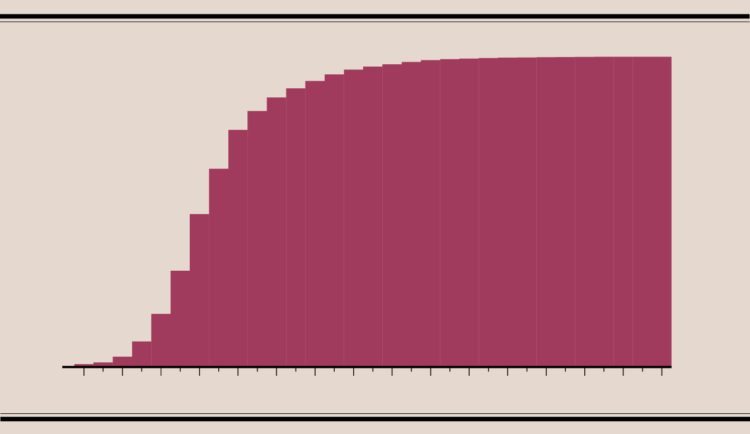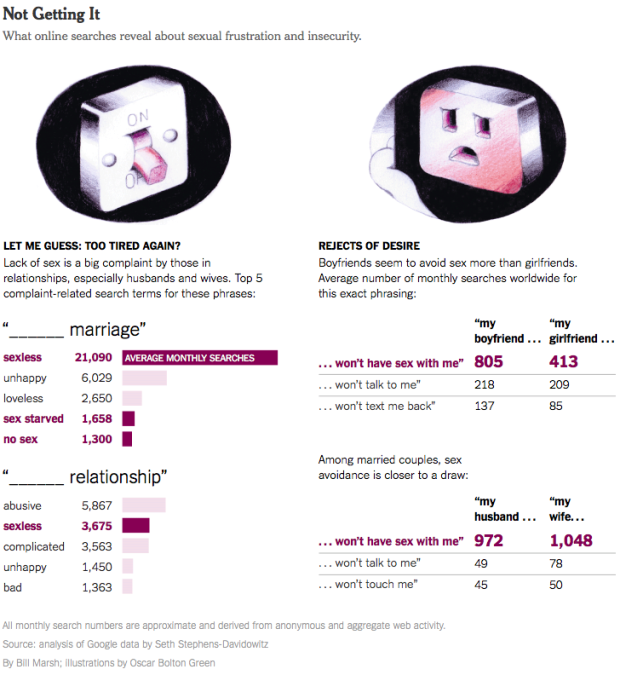The National Survey of Family Growth, run by the Centers for Disease Control and Prevention, asks participants about their birth and relationship history.
Category Archives: Sex
Posted by in Sex, Statistical Atlas, virginity
Changing internet markets for sex work
The internet changed how sex workers and clients find each other and how the former does business. Allison Schrager, Christopher Groskopf, and Scott Cunningham, reporting for Quartz, delve into actual numbers using scraped data from The Erotic Review:
Sex work is as old as civilization, but in the past 20 years the market for illegal sex services has undergone a radical transformation thanks to the internet, upending how it is sold and priced. There are now more women selling sex, more overall encounters, and—unlike in many other industries disrupted by the web—higher wages for workers.
Also safer (although still with its inherent risks).
Posted by in Internet, Sex, statistics
Married People Have More Sex
The relationship and dynamics change. Less lust, more companionship. Is that really how it works? Read More
Posted by in Data Underload, marriage, Sex
Let’s talk about sex: Why the Zika outbreak is really about reproductive rights for Latin American women
 Sarah Borg is a junior medical doctor trained in Adelaide, Australia with a Master of Public Health from The London School of Hygiene and Tropical Medicine. She is currently working as an intern in the
Sarah Borg is a junior medical doctor trained in Adelaide, Australia with a Master of Public Health from The London School of Hygiene and Tropical Medicine. She is currently working as an intern in thePosted by in & Prevention, featured, feminism, gender, Global Health, latin america, parenting, Planned Parenthood, reproduction, reproductiverights, Sex, south america, women, womenshealth, zika, zikavirus
Whither Obamacare? Philae phones home from comet! Approval for female libido drug?
Whither Obamacare? The fateful US Supreme Court ruling on the legality of many subsidies for Obamacare health insurance premiums (the case known as King v. Burwell) is nearly upon us. Perhaps it will come as soon as Monday (June … Continue reading
The post Whither Obamacare? Philae phones home from comet! Approval for female libido drug? appeared first on PLOS Blogs Network.
Posted by in ACA, Addyi, affordable care act, Astronomy, Comet 67P/Churyumov–Gerasimenko, comets, European Space Agency, flibanserin, health care, libido, Obamacare, On Science Blogs, Patient Protection and Affordable Care Act, pharmaceutical, Philae, Politics, Research, Rosetta, Sex, sexual behavior, united states, US Supreme Court, Viagra, women
Sexual insecurities found in Google search results
Seth Stephens-Davidowitz continues with his Google search data-related op-eds for the New York Times. This time he looks at the insecurities in sex, based on the search volume of various phrases.
Interesting. But preface the results with a big fat question of sample population before you make too many conclusions.
For example, a straightforward conclusion from the above graphic is that boyfriends avoid sex way more than girlfriends. That seems off. Could it be that boyfriends avoiding sex confuses the girlfriends more than the other way around, thus making it more likely for girlfriends to search?
Tags: Google, New York Times, sex
Posted by in Google, Infographics, New York Times, Sex
Science for the People: The Birth of the Pill

 This Science for the People is exploring the intersection of science, society, and sex with the origin story of the birth control pill. They speak to author Jonathan Eig about his book The Birth of the Pill: How Four Crusaders Reinvented Sex and Launched a Revolution. Writer Rose Eveleth also returns to talk about the history and design of the vaginal speculum.
This Science for the People is exploring the intersection of science, society, and sex with the origin story of the birth control pill. They speak to author Jonathan Eig about his book The Birth of the Pill: How Four Crusaders Reinvented Sex and Launched a Revolution. Writer Rose Eveleth also returns to talk about the history and design of the vaginal speculum.
*Josh provides research help to Science for the People and is, therefore, completely biased.
Filed under: This Mortal Coil Tagged: birth control, Jonathan Eig, Podcast, Rose Eveleth, science for the people, Sex, speculum, the pill, vagina
Posted by in birth control, Jonathan Eig, Podcast, Rose Eveleth, science for the people, Sex, speculum, the pill, This Mortal Coil, Vagina
Population Explosion 2.0, perfect writing software, model organism sex, tardiness
Son of The Population Explosion? It matters hardly at all what is done to control population growth. If Homo sap‘s birth and death rates remain more or less as they are, we will grow from 7 billion plus today … Continue reading
The post Population Explosion 2.0, perfect writing software, model organism sex, tardiness appeared first on PLOS Blogs Network.
Posted by in birth control, clinical research, contraception, Microsoft Word, population, Research, Sex, WordPerfect, writing software
Science for The People: The V Word
 This week, Science for The People looking at the social and biological science of female sex organs. They talk to Dr. Anthony Atala, director of the Wake Forest Baptist Medical Center Institute for Regenerative Medicine, about the creation and use of lab-grown vaginas. Biology professor Marie Herberstein exposes the bias against female genitalia in scientific studies. And science writer Emily Anthes tells them about the history and promising future of female condoms.
This week, Science for The People looking at the social and biological science of female sex organs. They talk to Dr. Anthony Atala, director of the Wake Forest Baptist Medical Center Institute for Regenerative Medicine, about the creation and use of lab-grown vaginas. Biology professor Marie Herberstein exposes the bias against female genitalia in scientific studies. And science writer Emily Anthes tells them about the history and promising future of female condoms.
Filed under: Follies of the Human Condition Tagged: genitalia, Podcast, reproduction, science for the people, Sex, vagina
Posted by in Follies of the Human Condition, genitalia, Podcast, reproduction, science for the people, Sex, Vagina
AP Sex Ed
Sex education should address the intersection of biology, interpersonal relationships, and society with a backing of solid science. It should and can be sex positive without promoting irresponsible behavior – indeed quality sex education leads to more responsible behavior. Quality sex education can also be aesthetically pleasing, as Carlin Soos demonstrates with “AP Sex Ed”.
Filed under: The Art of Science, This Mortal Coil Tagged: Carlin Soos, Education, Gender and Sexuality, Linkonomicon, Sex, sex education
Posted by in Carlin Soos, education, Gender and Sexuality, Linkonomicon, Sex, sex education, The Art of Science, This Mortal Coil




